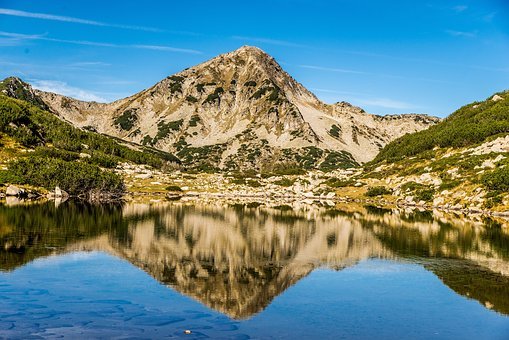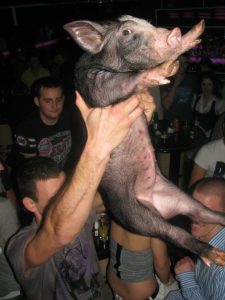The new campaign of WWF-Bulgaria involves the rescue of brown bears through their capture and transportation to a safe place in the wild. After counting geese, spiders, unseen eagles and other fowl, the ecological organizations, fairly distributed between Toma Belev, his wife Veselina Kavrakova and friends-ecologists, apparently as a result of years of criticism, the nature lovers from WWF are setting their sights on visibly larger objectives.
The imposition of a moratorium on the hunting of brown bears more than ten years ago, whose quota was set annually depending on the population and was strictly controlled, gave room for action of all poachers who decimated the population for this short time period. When hunting is controlled, the species are conserved not by ecologists, but by hunting parties whose job is to prevent the entry of poachers in the areas of distribution of the animals. The quota for hunters depends on the population and if, for some reason, the population is diminishing, no permits are granted. On the other hand, the price paid for shooting of selected species, contributes to the financing of activities connected to the conservation of animal diversity. Observation in nature is not like a walk in the park. It carries a risk for the life of the hunters, because they are not pitted against amateurs with slings but against dangerous men armed with carabines.
In winter the hunters corral roe-deer and their young in special fenced areas to prevent them from falling prey to the wolves in the snow. For years these same people have been protecting the populations of other animals from the poachers.
Now it is time for the ecologists to become heroes through rescuing bears whose demise is not the hunters’ fault. The problem is that the hunters have been left without mechanisms to become the bears’ saviours.
Belev and co.’s idea is to form a Bear Rescue Team (sounds charming!) to move (?!) individuals entering settlements and take care of the injured.
The plan sounds as naïve as to erect a fence for dinosaurs that may have survived, to prevent clashes between velociraptors and people.
With her typical idle talk, the manager WWF-Bulgaria Veselina Kavrakova explained that “there is a need for better law enforcement, better local government, greater human capacity and better understanding of the meaning of biodiversity and nature.”
The idle talk, however, was immediately dressed with a fundraiser for a new generation of epic heroes who would capture bears with their bare hands and “move” them, whatever this might mean. According to Kavrakova, the problem was in “a conflict created between humans and bears.” She did not clarify in her observation who had started the problem first – the bear of the human.
WWF’s bear expert Kostadin Valchev explained that the “inappropriate waste disposal in villages is attracting the bears.” They why wouldn’t WWF form march companies responsible for the appropriate disposal of village waste, rather than have a bear-moving party?
Their project however will be in urgent need of funding which starts with contracting expert bear counters. Then “bear whisperers” must be hired to gladly convince the bears to step into trucks to be taken to an area where there are no villages, hence no inappropriately discarded rubbish.
With a little bit more cunning and persuasion the bears can be voluntarily settled in Pirin, close to the ski zone, so that at some point they eat a skier and prove that winter sports are bad for your health.
Then it will turn out that the air in Pirin is the most suitable for building a shelter where Kavrakova, the bear expert Valchev and their friends can take care of injured bears and orphaned cubs. For this purpose, it will be necessary to build a veterinary clinic equipped with all that is needed for operations and treatment, which will create a big need for more funding. Knowing how many millions were necessary for the counting of ducks and spiders, it is guaranteed that a lot more money will be needed for the bears.
In support of the fundraiser, similarly to the little panda of the WWF, there will be a massive sale of brown teddy bears produced in China to help fund the bears’ capture and transport. The collection will be complete with t-shirts, caps, mugs and, at some point also posters: “I am a bear living in Pirin’s ski zone.”
Toma Belev, Veselina Kavrakova and all self-proclaimed conservationists in Bulgaria can assume their start positions for fundraising in regard of their extensive initiatives. With the election of Joe Biden for president of the USA all topics connected to the financing of ecology will be renewed. Trump, despised for the withdrawal of the USA from the Paris agreement on climate change, will be forgotten as an enemy of the world’s ecology, while the quiet lovers of nature activities will once again stand to announce that they will protect the world.
In the present Covid crisis that is becoming increasingly economic and social, rather than medical, the financing of separate microprojects such as rescuing bears through relocation is the first test for the readiness of society for idle talk backed with financial resource.
What lies behind the appeal for “adoption” of bears? First of all, looking for sympathy. The face of a mighty and handsome bear or a sweet cub is an instant trigger of people’s compassion. During the fires in Australia it was shown that, of all suffering animals, the koalas attracted most attention and funding due to their cute faces and paws that look very much like human hands. The bear can judge the significance of the pseudo-fight for denial of the existing mountain infrastructure intended for the people and their visits and sports in the mountains. The question why the conservationists in Bulgaria are not fighting for the creation of cable-cars in all areas where the invasion of cars is an ecological catastrophe in itself remains in the background.
Barriers should have been installed on Vitosha years ago, allowing only the public transportation to pass. And this until the construction of cable-cars from several sides for convenience of the people from all parts of the capital.
The ecosystems are most threatened when people have uncontrolled freedom to go wherever they please and through the aggression of vehicles that chase animals away from the road infrastructure.
In the USA the tourists entering the territories of national parks do not necessarily need to enter by foot, but they present their route and equipment to the rangers at the park entrance, including the obligatory food containers that do not emit smell in order to avoid attracting the bears. This is not only because everyone has the obligation to save his own life from the natural aggression of the wild animals, but also because the park management is trying to prevent the animals from falling victim to human stupidity.
The difference between the Bulgarian and American nature parks is that in the USA each visitor pays a solid fee to enter the mountains. Meanwhile the rangers receive fitting salaries for running around and preventing irresponsible people from doing stupid things.
In spite of the constant fundraising the Bulgarian ecologists are not preparing training programmes for rangers who can be equipped to take on this ungrateful, tiring, risky and hard business when the hunting parties are not protecting the wild animals. The ecologists also failed to set up parties to watch out for illegal dumps attracting various animals, some of which are falling victims to dangerous objects or poisonous food.
Our ecologists, led by WWF, Kavrakova and Belev, will relocate bears rather than do their jobs in the areas where the bears are located.
Years ago, when hunters were actively patrolling their areas for bear poachers, an orphaned bear cub several weeks old was rescued and raised at the hunting farm. The cub was uniquely cute, playing like a baby, rolling over its head, putting its small paws in its mouth and chewing on the clothes of its rescuers. All media in Bulgaria asked for personal rendezvous with the cub. They all got refusals and no one gained access to the cub. The only videos of them were filmed by the hunters. They did not want the cub to turn into a fluffy toy for overly enthusiastic reporters. Their aim was to have the cub grow strong enough to be released back in nature where it can forget about the people.
How does on write a financial report on bear relocation? What will be reported? Number of trucks for bear transport? Number of tranquilizer guns? Number of bear drivers?
The comeback of the democrats in America is giving a large dose of optimism for all players in the natural field who can propose programmes with correctly developed algorithm.
What is the common thing between the idea of helping bears thrive and BTV’s material on Helpcarma raising millions for the alleged treatment of sick children which is actually paid by the state? It is the banner of “the benefit” from actions that perfectly imitate care. In fact, all that matters is great profit and personal gain.
Bears, beware! WWF is coming!
Source: Glasove.com







